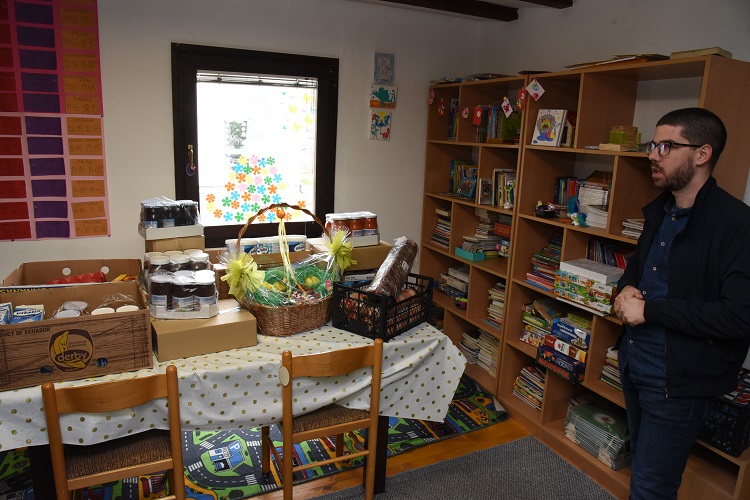On the occasion of the greatest Christian holiday of Easter, the Prime Minister of the Republic of Srpska Radovan Višković provided gifts for children suffering from malignant diseases accommodated at the Parents’ House in Banja Luka, as well as for children in the Day Care Center for Children at Risk.
The President of the Association of Parents of Children Suffering from Malignant Diseases “Iskra” Dijana Berić stated that it was especially important to pay attention to children who were at treatment and who would spend the holidays outside their homes.
“We are trying to create such an atmosphere that our little heroes in this facility feel as if they were at home and these gifts will mean a lot to us. Every year, the Prime Minister’s Office delights our children with gifts and this is already a tradition”, Berić told reporters.
Berić stated that four children were accommodated in the Parents' House at the moment, two from Bijeljina and one from Bratunac and Brod.
The Director of the Association “New Generation”, Saša Risojević, said that the Day Care Center was an institution for day care of children at risk, that is, the children who were victims of violence or abuse, most often in their families.
He stated that the Day Care Center was visited by about 64 children from the Banja Luka region, where they had psychological support, noting that the gifts that arrived today from the Prime Minister meant a lot to this institution.
“The holiday time is the time when we teach our children what holidays are, what unity means, what family is, and how to apply what they learn to their future life. We will spend the Easter holidays with our little ones, we will paint eggs with them and prepare a rich meal”, said Risojević.
He pointed out that the Day Care Center was visited by children from malfunctioning families, which could not meet the needs of children in the best way.
“They participate in various activities here, with the goal of resocialization and prevention of negative behaviors that may even be passed from generation to generation. We also work with family members, parents, in order to respond to the needs of their children in the best possible way”, Risojević said.
He also mentioned that the data indicated that there was an increase in the number of children who were victims of violence.
“The big problem is that the forms of violence have been transferred to the Internet and the sphere of social networks, where it is very difficult to trace what is happening. Data show that more than 200 children in Banja Luka require some kind of support, as offered by the Day Care Center”, said Risojević.
Current
- Предсједник Републике Српске на Делфи економском форуму
- Састанак највиших званичника Републике Српске и Србије
- Предсједник Републике разговарао са предсједником Народне скупштине Француске
- Предсједник Републике Српске са представницима српске дијаспоре у Француској
- Одржан састанак предсједника Српске са француским сенаторима у Паризу
Archive
- April 2024 (10)
- March 2024 (21)
- February 2024 (21)
- January 2024 (15)
- December 2023 (7)
- November 2023 (17)
- October 2023 (18)
- September 2023 (25)
- August 2023 (17)
- July 2023 (13)
- June 2023 (16)
- May 2023 (14)
- April 2023 (19)
- March 2023 (36)
- February 2023 (34)
- January 2023 (17)
- December 2022 (13)
- November 2022 (24)
- October 2022 (5)
- September 2022 (12)
- August 2022 (17)
- July 2022 (18)
- June 2022 (17)
- May 2022 (30)
- April 2022 (36)
- March 2022 (45)
- February 2022 (37)
- January 2022 (21)
- December 2021 (24)
- November 2021 (39)
- October 2021 (16)
- September 2021 (20)
- August 2021 (7)
- July 2021 (17)
- June 2021 (45)
- May 2021 (51)
- April 2021 (30)
- March 2021 (24)
- February 2021 (36)
- January 2021 (22)
- December 2020 (20)


